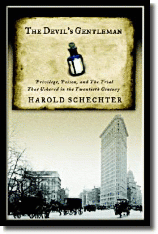 Harold Schechter is a professor of American Literature and culture at Queens College, the City University of New York. Among his nonfiction works are the historical true-crime classics Fatal, Fiend, Deviant, Deranged, and Depraved. He also writes a critically acclaimed mystery series featuring Edgar Allan Poe, which includes The Hum Bug and Nevermore and The Mask of Red Death, and studies of popular culture, including Savage Pastimes: A Cultural History of Violent Entertainment.
Harold Schechter is a professor of American Literature and culture at Queens College, the City University of New York. Among his nonfiction works are the historical true-crime classics Fatal, Fiend, Deviant, Deranged, and Depraved. He also writes a critically acclaimed mystery series featuring Edgar Allan Poe, which includes The Hum Bug and Nevermore and The Mask of Red Death, and studies of popular culture, including Savage Pastimes: A Cultural History of Violent Entertainment.He applied the "Page 99 Test" to his latest book, The Devil's Gentleman: Privilege, Poison, and the Trial That Ushered in the Twentieth Century, and reported the following:
I can't say p. 99 is more or less illuminating than any other page of The Devil's Gentleman, though of course it reflects the overall genius of the book, as does each and every one of its meticulously crafted and lapidary sentences. Certainly, a reader limited to p. 99 wouldn't get a sense of the book's main subject, which is a sensational double poisoning case, known as the Molineux affair, that riveted New York City -- and indeed much of the nation -- at the turn of the last century. The page in question is part of a chapter dealing with the birth of yellow journalism and the beginnings of the famous newspaper war between Joseph Pulitzer and William Randolph Hearst, who together turned the Molineux case into the biggest media circus of its day. In any case, Ford's statement strikes me as one of those clever-sounding epigrams that, upon the slightest reflection, make no sense at all.Read an excerpt from The Devil's Gentleman, and learn more about the book and author at Harold Schechter's website.
--Marshal Zeringue



